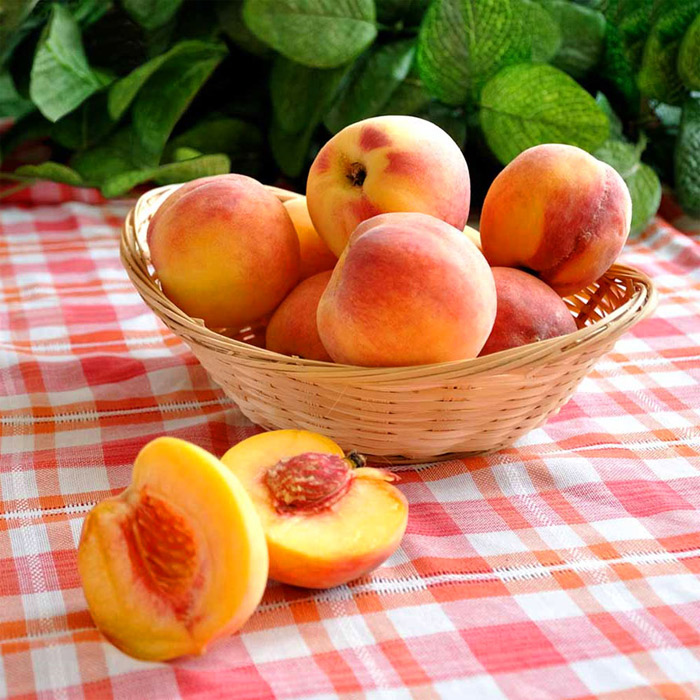
Please call us to find out about our services.
 856-691-2497
| Fax 856-692-9007
856-691-2497
| Fax 856-692-9007

Peaches offer a sweet, slightly tangy taste. Ripe peaches are juicy and fragrant, making them popular fresh snacks. Their texture varies based on ripeness, from firm and crunchy to soft and juicy. Peaches develop maximum sweetness when allowed to ripen fully. Slightly firm peaches have a mild flavor and crisp bite. As peaches ripen, they soften, releasing sweet juices and a floral aroma.
Peaches provide valuable nutrients, contributing to a balanced diet. Rich in vitamins A and C, peaches support healthy skin and a strong immune system. Vitamin A promotes good vision, while vitamin C acts as an antioxidant, protecting cells from harm. Potassium, another nutrient in peaches, helps maintain proper heart function and regulate blood pressure.
Additionally, peaches contain fiber, beneficial for digestion. Regular fiber intake promotes digestive health and supports stable blood sugar levels. Eating peaches frequently helps ensure adequate fiber intake without much effort, benefiting overall well-being.
Peaches are incredibly versatile in various culinary settings. Fresh peaches can be sliced and eaten directly as a simple snack. For breakfast, sliced peaches add sweetness to cereals, oatmeal, or yogurt. Fresh peach slices also make delicious toppings for pancakes or waffles.
Salads gain refreshing sweetness from ripe peach slices. Peaches pair wonderfully with leafy greens, nuts, cheeses, or grilled meats, creating flavorful salads without complex preparations. Similarly, peaches can be combined with berries and other fruits for tasty fruit bowls or quick desserts.
Peaches can be grilled, producing caramelized sweetness. Grilled peaches make an easy side dish, served warm or cooled slightly. Pair grilled peaches with creamy cheese or vanilla ice cream for a delicious treat.
Preserving peaches enhances their usefulness throughout the year. Canning fresh peaches in syrup keeps them flavorful beyond summer. Peach preserves or jams bring sweetness to morning toast, sandwiches, or desserts throughout colder months.
Proper storage extends the life and taste of peaches. To ripen firm peaches, keep them at room temperature. Check daily, as peaches ripen quickly once softened. When ripe, store peaches in the refrigerator to slow further ripening and maintain freshness. Refrigerated ripe peaches typically stay fresh for several days.
Freezing peaches extends their enjoyment into winter months. Slice peaches and freeze them on a tray, preventing clumping. Once frozen, store slices in sealed bags or containers. Frozen peach slices easily thaw and taste fresh, ideal for smoothies, baking, or sauces.
Drying peaches offers another preservation method. Thinly sliced peaches dried in an oven or dehydrator create chewy, flavorful snacks. Dried peaches provide convenient, nutritious snacks without added sugars or preservatives.
Choosing peaches wisely improves taste and satisfaction. Look for peaches without bruises, wrinkles, or soft spots. Ripe peaches smell sweet near the stem area and give slightly when gently pressed. Firm peaches with faint aroma need ripening at home before eating.
Peach color alone isn't reliable for determining ripeness. Some peach varieties stay greenish or pale, even when ripe. Aroma and gentle firmness provide better indicators.
Peaches have a fascinating history dating back thousands of years. Originating in China, peaches traveled along trade routes to Persia, eventually reaching Greece and Rome. This long journey made peaches cherished fruit worldwide.
The fuzziness on peaches protects them from insects and sunlight damage. Tiny hairs create a barrier against pests and excess moisture loss, helping peaches stay fresh until harvest.
In symbolism, peaches represent longevity and luck, especially in Asian cultures. Peaches frequently appear in artwork and celebrations, symbolizing long life and prosperity.
The "Georgia peach" nickname comes from Georgia's large peach-growing industry, despite California currently leading peach production in the U.S. The state maintains this proud nickname due to its historical significance in peach cultivation.
Peaches belong to the rose family, related closely to cherries, apricots, almonds, and plums. This botanical family connection explains similarities in their pits and overall characteristics.
Peaches represent deliciousness and nutritional value, bringing delight through fresh flavors and kitchen versatility. Proper selection, storage, and preservation maximize enjoyment. Rich in nutrients and fascinating in history, peaches remain a beloved summer staple, deserving appreciation beyond their seasonal availability.